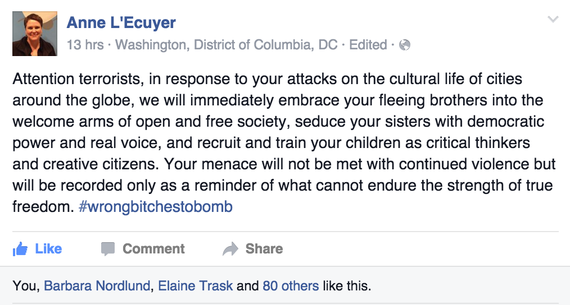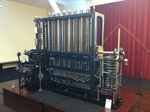Eric Elnes: Beyond Paris: The Life Machine
In the wake of last Friday's atrocities in Paris, many of us reacted to our feelings of despair and helplessness by reaching out to the world by changing our Facebook profile pictures to reflect both our agony and empathy for the victims. While I was changing my profile picture, however, one of my Facebook friends, Anne L'Ecuyer, went a step further. She cast a vision for responding to terrorism that the world sorely needs, yet has thus far proven itself incapable of implementing. This is what she wrote:
In a world that seems to be marching steadily toward what Pope Francis has called a "piecemeal Third World War," the kind of change that needs to take place to make my friend Anne's vision a reality is to move in a direction that is far more in alignment with the vision of life that Jesus advocated for in his Sermon on the Mount than we are now. (Matthew 5, Luke 6)
I suffer no illusions that our government or any other is going to shift gears and follow Jesus' program, meeting the dangers we face by devoting more attention and resources to loving our enemies than bombing them, or to doing good to those who hate us than crushing them. But why aren't more Christians doing so? Is protesting innocuous Starbucks cups all we get excited about?
Other faiths have their own way of articulating some of the core principles in Jesus' sermon -- especially when it comes to doing unto others what one would have done unto oneself -- so I don't mean to imply that Christians are the only ones who need to start living more radically by the principles they themselves espouse. But since I'm a Christian, I'll leave criticism of other faiths to their practitioners.
While Jesus tended to ask more questions of his followers than provide answers, the one place in the gospels where Jesus comes out and states clearly what it means to follow him -- even commands it -- is in his Sermon on the Mount. Clearly, we're not following his most basic teachings. Says Jesus, "If you love those who love you, what credit is that to you? For even sinners love those who love them. If you do good to those who do good to you, what credit is that to you? For even sinners do the same. If you lend to those from whom you hope to receive, what credit is that to you? Even sinners lend to sinners, to receive as much again. But love your enemies, do good, and lend money, expecting nothing in return. Your reward will be great, and you will be children of the Most High; for [God] is kind to the ungrateful and the wicked." (Luke 6:32-35)
If more of us don't make meaningful efforts, on a massive scale, to put these words into practice, just how can we hope to avoid stumbling into a "piecemeal Third World War" -- one that promises to shake the very foundations of human civilization?
You may object that if Jesus' most basic commands have effectively been ignored for two thousand years, there is little hope we can change now. But consider how much has changed in the last century or two that could not have been remotely predicted just a few years beforehand -- from the abolition of slavery, to women's suffrage, to legal same-sex marriage, to legalized marijuana. Regardless of your opinions on these or other changes, what everyone can agree on is that they happened, and happened fast once public opinion changed, most often in response to a pressing need.
Consider the case of the programmable computer. The very first programmable computer was actually invented in 1860 by a mechanical engineer named Charles Babbage.
Babbage's computer, which he called the "Difference Engine," was so sophisticated that, when it was finally constructed by the London Science Museum in 1991, its math calculations returned results to the 31st digit!
You may wonder why a machine as revolutionary as the programmable computer wasn't built in Babbage's lifetime. Its massive weight and size were not the issue (weighing in at 15 tons, with 25,000 movable parts!). The main reason his Difference Engine wasn't built was that it was too revolutionary for its time. People didn't understand it. More importantly, there was no pressing or obvious need for a Difference Engine. Manufacturing tolerances weren't anywhere close to what it could design. Talk about the right idea for the wrong time!
The right time came in WWII when the Nazis designed a cipher machine that could create code for transmitting military messages that the allied forces had no ability to crack. It changed the course of the war. In response, Great Britain's Government Code and Cypher School launched a massive effort to invent a machine that could break the code. After months of work and drawing inspiration from Babbage's Difference Engine, computer scientist Alan Turing did just that. His "Turing Machine" became the first programmable computer that was ever built. It cracked the "unsolvable" Nazi code, saving millions of lives and eventually helping win the war.
Now that human civilization is teetering on the edge of another world-wide outbreak of violence, we need a new Turing Machine. Not a machine that cracks Nazi military code, but way of life - call it a Life Machine -- capable of breaking the ancient code of hatred, fear and violence itself. Or at least we need to implement a vision for life that reduces the effects of these ancient codes dramatically enough to ensure that human civilization survives and thrives in the coming centuries.
I believe that for the first time in human history we are actually capable of creating this Life Machine. In the Christian community, we can build our version of the Life Machine not by coming up with a new vision for life on earth, but making use of an old one that has sat in mothballs for two millennia. Jesus' Sermon on the Mount may become for us what Babbage's "Difference Engine" was for the Alan Turing.
Admittedly, we Christians have rarely committed ourselves collectively to Jesus' vision. Like Babbage's Difference Machine, it has taken a long time -- and a pressing threat to human civilization - for us to finally realize the gift we've been given. But now it is clearer than ever that Jesus' gift is capable of saving our world. It's time to act.
We don't need to wait for our government, or any other, to garner the political will or spiritual conviction to create one. All it takes is the will of those who call themselves followers of Jesus, who consider his Sermon on the Mount to be authoritative for their lives and are willing to live for his vision no matter how politically incorrect or inexpedient it may be.
Will we change the world by following Jesus' ancient model? That's not for us to decide. Years ago, Rev. Martin Luther King, Jr., who himself provided some of the vital components of our own Life Machine wrote, "Young ladies and gentlemen, the lord does not ask you to solve the great problems of the world. He does not ask you to unravel the enigmatic mysteries of life. Brothers and sisters, this is all you have to do. You have to let your light shine. Don't be a part of the darkness. Let your light shine."
Whether or not the light we emit changes the world, of one thing we can be certain: the light we shine by implementing Jesus' vision will change us, and continue to change future generations of the faithful. This, I trust, is all that ultimately matters to you, to me and to Jesus.
Follow Eric Elnes on Twitter: www.twitter.com/ericelnes



